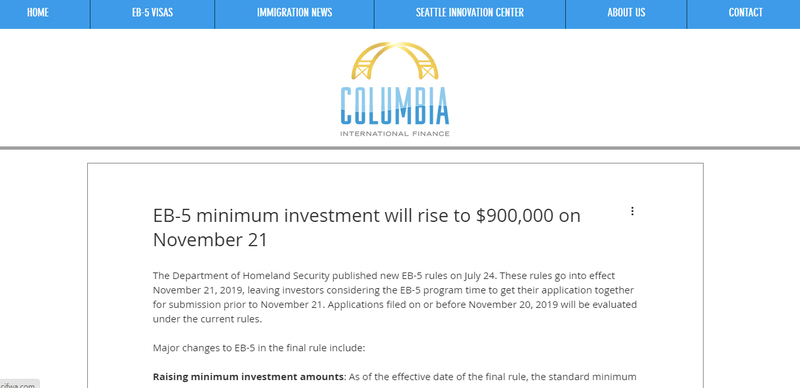EB-5 minimum investment will rise to $900,000 on November 21
The Department of Homeland Security published new EB-5 rules on July 24. These rules go into effect November 21, 2019, leaving investors considering the EB-5 program time to get their application together for submission prior to November 21. Applications filed on or before November 20, 2019 will be evaluated under the current rules.
Major changes to EB-5 in the final rule include:
Raising minimum investment amounts: As of the effective date of the final rule, the standard minimum investment level will increase from $1 million to $1.8 million, the first increase since 1990, to account for inflation. The rule also keeps the 50% minimum investment differential between a TEA and a non-TEA, thereby increasing the minimum investment amount in a TEA from $500,000 to $900,000. The final rule also provides that the minimum investment amounts will automatically adjust for inflation every five years.
TEA designation reforms: As of the effective date of the final rule, DHS will eliminate a state’s ability to designate certain geographic and political subdivisions as high-unemployment areas; instead, DHS would make such designations directly based on revised requirements in the regulation limiting the composition of census tract-based TEAs. These revisions will help ensure TEA designations are done fairly and consistently, and more closely adhere to congressional intent to direct investment to areas most in need. This will impact current projects in a TEA that may not be recognized after Nov 21.
Allowing EB-5 petitioners to keep their priority date: The final rule also offers greater flexibility to immigrant investors who have a previously approved EB-5 immigrant petition. When they need to file a new EB-5 petition, they generally now will be able to retain the priority date of the previously approved petition, subject to certain exceptions.
TEA designation reforms: As of the effective date of the final rule, DHS will eliminate a state’s ability to designate certain geographic and political subdivisions as high-unemployment areas; instead, DHS would make such designations directly based on revised requirements in the regulation limiting the composition of census tract-based TEAs. These revisions will help ensure TEA designations are done fairly and consistently, and more closely adhere to congressional intent to direct investment to areas most in need. This will impact current projects in a TEA that may not be recognized after Nov 21.
Allowing EB-5 petitioners to keep their priority date: The final rule also offers greater flexibility to immigrant investors who have a previously approved EB-5 immigrant petition. When they need to file a new EB-5 petition, they generally now will be able to retain the priority date of the previously approved petition, subject to certain exceptions.
https://www.cifwa.com/post/eb-5-minimum-investment-will-rise-to-900-000-on-november-21
Mentions
- Columbia International Finance, LLC (formerly Columbia International Finance Washington)
- Seattle Innovation Center
States
- Washington
Securities Disclaimer
This website is for informational purposes only and does not constitute an offer or solicitation to sell shares or securities. Any such offer or solicitation will be made only by means of an investment's confidential Offering Memorandum and in accordance with the terms of all applicable securities and other laws. This website does not constitute or form part of, and should not be construed as, any offer for sale or subscription of, or any invitation to offer to buy or subscribe for, any securities, nor should it or any part of it form the basis of, or be relied on in any connection with, any contract or commitment whatsoever. EB5Projects.com LLC and its affiliates expressly disclaim any and all responsibility for any direct or consequential loss or damage of any kind whatsoever arising directly or indirectly from: (i) reliance on any information contained in the website, (ii) any error, omission or inaccuracy in any such information or (iii) any action resulting therefrom.




